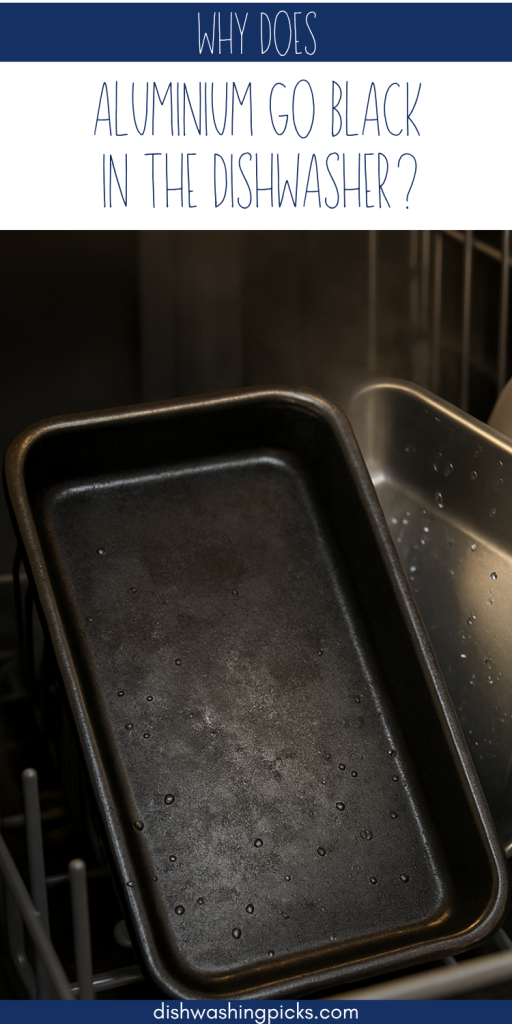
The Mysterious Case of the Blackened Pan
Ever pulled your favorite aluminum pan out of the dishwasher only to find it looking like it’s been through a volcanic eruption? Yeah, you’re not alone. That once-shiny surface now has a dull, darkened, almost scorched look—and suddenly you’re wondering if your dishwasher is secretly running a side hustle as a metal-aging machine.
But why does this even happen? Is it dangerous? And—perhaps most importantly—can you undo it? Grab your detective hat and a coffee (or maybe just that stained pan), and let’s get into it.
Next up, we’ll peel back the science behind this silvery sabotage.
So, What’s Actually Happening to the Aluminum?
Okay, here’s the deal. Aluminum is a reactive metal. It doesn’t love harsh environments. And dishwashers? They’re kind of the wild west for kitchenware—hot water, powerful jets, strong detergents. It’s like sending your cookware into a storm without an umbrella.
Most dishwashing detergents contain alkaline salts and enzymes that are great at blasting away food… but they’re not so kind to aluminum. When aluminum is exposed to those harsh detergents and high temperatures, a chemical reaction occurs—oxidation. That reaction creates a layer of aluminum oxide, which is what causes the dark, dull discoloration.
Imagine it like a tan—but instead of sun-kissed glow, your cookware comes out looking like it got caught in a thunderstorm.
Coming up next: Can it be fixed? Or is your pan doomed forever?
Is It Reversible? Can I Save My Darkened Aluminum?
Here’s the good news: In most cases, yes—you can bring it back to life. It takes a little elbow grease, but it’s not a lost cause.
Try this:
Grab some white vinegar and a soft cloth or sponge. Gently rub the blackened surface with vinegar, and rinse thoroughly. The acidity in the vinegar helps break down the oxide layer. Don’t expect miracles on the first go, but with a bit of patience, you can often restore that silvery shine.
There are also commercial aluminum cleaners out there if you want to get a bit more aggressive. But avoid using anything abrasive—that could scratch the surface and make things worse.
So now that we’ve (sort of) solved the cleanup mystery, the next question is: can you prevent this from happening in the first place?
Let’s talk prevention…
How to Keep Aluminum from Turning on You
If your aluminum pans are feeling betrayed, it’s not personal. But here’s how to keep the peace between them and your dishwasher:
- Hand wash aluminum. Simple. Easy. Foolproof.
- If it’s anodized aluminum, check if it’s dishwasher safe—some are, some aren’t. Read the label!
- Avoid acidic or salty dishwasher detergents when possible. They’re part of the culprit.
- Don’t mix aluminum with stainless steel in the same dishwasher cycle—this can trigger something called “galvanic corrosion.” Fancy, huh? Just keep them apart.
Basically, the dishwasher might save you time, but if you’re tossing in aluminum, it could cost you in the long run.
Now, let’s wrap this up with some final thoughts (and a little reality check).
Dishwasher or Dish Risk?
Here’s the real takeaway: Aluminum and dishwashers just aren’t besties. If you care about keeping that sleek, silvery look, give aluminum the VIP treatment—hand-washing and gentle care.
But hey, if you’ve already darkened your favorite pot, don’t panic. With a little attention and the right technique, you can usually make it shine again.
So next time you’re loading the dishwasher and wondering, “Hmm, should I throw this in too?”—remember your aluminum’s dramatic flair for turning dark. And maybe, just maybe, spare it the dishwasher drama.
